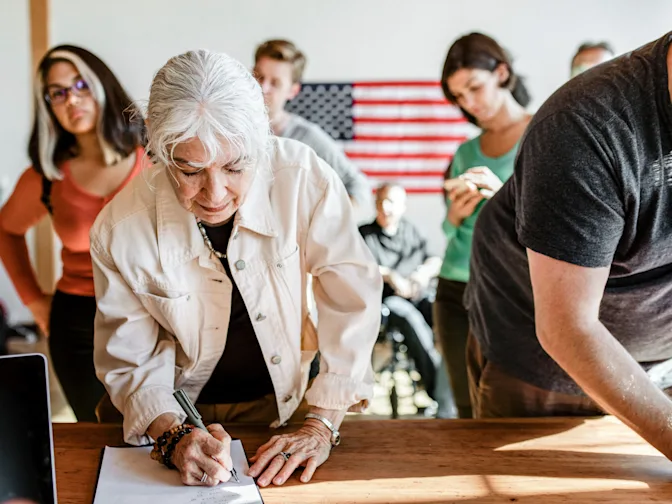
Trump's New Tool Could Block You From Voting
The Trump administration has quietly rolled out a national citizenship database that's stirring up a firestorm over privacy and government overreach. This searchable system, developed through a collaboration between the Department of Homeland Security and the Department of Governmental Efficiency (DOGE), is designed to help state and local election officials verify voter eligibility. While officials tout it as a tool to crack down on voter fraud, critics warn it's a privacy risk that could lead to misuse of sensitive personal information.
A New Era of Voter Verification
For decades, election officials have struggled with verifying citizenship status. Without a centralized list, they've had to rely on patchwork methods, asking voters for birth certificates or passports or cross-referencing multiple databases that don't always communicate. This cumbersome process has often led to delays and, some argue, disenfranchisement.
Enter the Department of Homeland Security's new database, developed in partnership with the DOGE. It's an expansion of the existing Systematic Alien Verification for Entitlements (SAVE) program, which has been used since the 1980s to check immigration status for government benefits. Now, SAVE has been upgraded to integrate Social Security Number data, allowing election officials to quickly check the citizenship status of millions of Americans, both naturalized and U.S.-born, using Social Security Numbers.
This integration is a significant development, according to the DHS, which says it will significantly improve the ability to detect benefit and voter fraud among noncitizens. The agency has already run over 9 million voter records through the system, finding 99.99% to be U.S. citizens, though this analysis has not been independently verified.

Privacy Concerns and Legal Pushback
But the database's rapid rollout and lack of public input have raised alarms. The Privacy Act of 1974 requires federal agencies to notify the public when they plan to collect or use personal data in new ways. Yet, no such public notice appears to have been issued for this massive data consolidation effort. Legal experts say this bypasses important privacy and security protections that were built into the separate agencies' systems.
Critics argue that the database could be used to intimidate immigrant communities and suppress voter turnout. Immigration legal advocates say the premise of noncitizen voter fraud has been used as a pretext to discredit entire groups, and this centralized system only amplifies those risks.
Sarah Igo, a history professor at Vanderbilt University, said, "One thing that's rather striking about these moves around data in the present is that there has been so little outcry actually on the right, who have been sort of the standard bearers of worry about big government and data merging and data collection to begin with," as reported by NPR.
Some conservatives are worried as well. Catherine Engelbrecht, the founder of the nonprofit True the Vote expressed discomfort about the administration's efforts to centralize various federal databases and give access to the contractor Palantir. "Such centralization of data poses a threat to individual freedoms and privacy," she wrote. "Surrendering our data to unchecked power isn't just a technical risk — it's a moral failure."
Data Accuracy and Reliability Questions
Beyond privacy, questions swirl about the accuracy of the data itself. The Social Security Administration only began tagging citizenship status about 40 years ago, meaning records for many natural-born citizens may be incomplete or missing. The SAVE system also has known limitations, such as lag times between naturalization and data entry, which could mistakenly flag newly naturalized citizens as noncitizens.
Experts warn that mismatches and errors are inevitable when combing through hundreds of millions of records, and the stakes are high when someone's right to vote is questioned. Election officials must manually review any uncertain cases and contact voters for proof of citizenship, but the process could still lead to confusion and disenfranchisement.
Political and Legal Context
The database is part of a broader Trump Administration push to overhaul election protocols and crack down on alleged voter fraud, despite overwhelming evidence that such fraud is vanishingly rare. The Justice Department has prioritized prosecuting noncitizens who register to vote, and Republican lawmakers are pushing legislation requiring proof of citizenship for voter registration.
This effort follows a 2025 executive order mandating the DHS to provide states with access to systems for verifying citizenship without cost, and instructing the DOGE to assist in combing voter rolls for noncitizens. The order also directs the attorney general to prioritize prosecuting noncitizens who register to vote, whether or not they actually cast ballots.
Transparency and Public Trust
One of the most contentious aspects is the lack of transparency. The public has largely been kept in the dark about the database's creation and use. Even some state election officials were unaware of the new capabilities, and the agency managing the system declined interview requests.
Justin Levitt, a Loyola Law School professor and former Biden White House adviser on voting rights, said, "Before the federal government just up and creates a massive data system that purports to be a record on all of us — that's a public conversation that we're owed," as reported by NPR. He continued, "And not just as a public policy matter, as a moral matter, as a legal matter."
The Trump Administration has briefed conservative groups known for promoting election fraud conspiracy theories, raising concerns about the politicization of the tool. Experts say such a significant data project deserves public scrutiny, elected representatives' input, and opportunities for public comment.
The High-Stakes Balance
At its core, this citizenship database represents a high-stakes clash between national security and personal privacy. On one side, election officials and the Trump Administration argue that the tool is necessary to protect election integrity and prevent fraud. On the other, privacy advocates, legal experts, and civil rights groups warn that the database threatens Americans' privacy rights and could be misused to target vulnerable populations.
The consolidation of personal data into a single, searchable system is a major shift in the U.S., a country that has historically resisted centralized citizen rosters. The debate over this database touches on fundamental questions about how much power the government should have to collect and use personal information, especially when the data is used to influence who can participate in democracy.
For now, the database is operational in states including Louisiana and Texas, with plans to expand access and integrate additional data sources like state motor vehicle records. But legal challenges and public outcry suggest the controversy is far from over. As this story unfolds, it will test the limits of privacy protections and the public's trust in government oversight.
References: Trump officials create searchable national citizenship database | Trump Admin Is Building a Searchable Database to Track Citizens | The Trump administration is building a national citizenship data system | The Trump administration is building a national citizenship data system






















